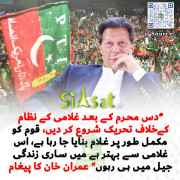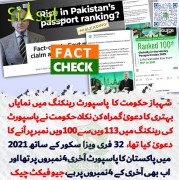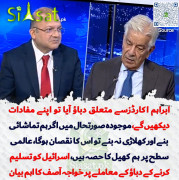adnan_swati
Senator (1k+ posts)
In a rather strange move, the education ministry has made an odd proposal to the government regarding amendments to the charter of the National University of Modern Languages (NUML). The proposal pertains to command and control of the university, specifically proposing the replacement of the president of the country as the chairman of the universitys board of governors with the Chief Of Army Staff (COAS). Furthermore, against the principles of the Higher Education Commission (HEC), the new ordinance makes it compulsory for the chairman of the universitys board of governors, whom they now hope will be the COAS, to appoint only senior serving or retired army officers as Vice-Chancellor (VC) and rector of the university.
Notwithstanding the fact that NUML was given the charter to operate as a public sector university, which means that it has to follow HEC criterion, the army probably thinks that the only qualification the universitys VC and rector are meant to possess is the ability to discipline. Forget about having PhDs or higher qualification in a particular discipline. Even if there is hue and cry over the issue of qualification, the army may resolve the issue by using NUML or the National Defence University (NDU) to grant PhDs in record time as had happened in the case of a former VC of Quaid-i-Azam University, who happened to be a retired army officer. One should also not forget the case of NUMLs own rector, Brigadier (retd) Aziz Ahmad Khan, who obtained a PhD in English Literature in record time while serving in the university. Clearly, the army does not want to let go of the NUML, which was established in 1970 as the National Institute of Modern Languages (NIML) to train government officials in different languages. Since there was a significant number of military officers trained at NIML, the institute was controlled by the GHQ. The NIML got a charter which enabled it to have university status in 2000 through a presidential ordinance, according to which the chairman of its board was the president.
The situation continued until a civilian became president, who, according to HEC laws, is the chancellor of all public-sector universities. This does not mean that the president involves himself with the day-to-day running of the institution but the university could, once in a while, call the president for a convocation or any other ceremony. However, it seems the army cannot even tolerate a civilian head of the state to perform that ceremonial role. The pressure to make changes in the universitys charter from the GHQ must be immense since the education ministry has even ignored the comments of the education committee of parliament, headed by Abid Sher Ali, which rejected the above proposal. There are four explanations to explain the armys interest in holding on to its university. First, it continues to feel slighted about the spat between one of NUMLs civilian lecturers and registrar Brigadier Ranjha in 2010. The latter had physically abused the former and tried to muffle debate on politics during a discussion on geopolitics. Second, controlling the university helps strangulate all debate which the army feels is contrary to the dominant narrative of national security that it wants to popularise.
Third, tight command and control can be used to counterfeit qualifications and produce degrees for serving or retired officers. Finally, this is part of the larger agenda of making inroads into education. The military has not only obtained a charter for the NDU, which is also operating against HEC criterion, but several of its foundations are engaged in setting up private universities. Not to forget that the army is using state resources to send people to foreign universities on official grants who could then serve in Aabpara. And there are some who have been launched in academia by having fabricated qualifications.
All of this damages higher education. For anyone who wants to argue that public sector universities were never great, the answer is that Pakistani public sector universities had some of the best qualified people until these institutions fell prey to intervention by the establishment. Institutions such as the University of Punjab were infested with the religious right, while the Quaid-i-Azam University was injected with state-sponsored academics, many of whom were recruited into Pakistans soft image creation project.
I wonder who can tell the establishment that our image can only improve if academia is allowed to grow naturally? Propaganda by ill-qualified people takes us nowhere.
Published in The Express Tribune, March 20th, 2011.
Notwithstanding the fact that NUML was given the charter to operate as a public sector university, which means that it has to follow HEC criterion, the army probably thinks that the only qualification the universitys VC and rector are meant to possess is the ability to discipline. Forget about having PhDs or higher qualification in a particular discipline. Even if there is hue and cry over the issue of qualification, the army may resolve the issue by using NUML or the National Defence University (NDU) to grant PhDs in record time as had happened in the case of a former VC of Quaid-i-Azam University, who happened to be a retired army officer. One should also not forget the case of NUMLs own rector, Brigadier (retd) Aziz Ahmad Khan, who obtained a PhD in English Literature in record time while serving in the university. Clearly, the army does not want to let go of the NUML, which was established in 1970 as the National Institute of Modern Languages (NIML) to train government officials in different languages. Since there was a significant number of military officers trained at NIML, the institute was controlled by the GHQ. The NIML got a charter which enabled it to have university status in 2000 through a presidential ordinance, according to which the chairman of its board was the president.
The situation continued until a civilian became president, who, according to HEC laws, is the chancellor of all public-sector universities. This does not mean that the president involves himself with the day-to-day running of the institution but the university could, once in a while, call the president for a convocation or any other ceremony. However, it seems the army cannot even tolerate a civilian head of the state to perform that ceremonial role. The pressure to make changes in the universitys charter from the GHQ must be immense since the education ministry has even ignored the comments of the education committee of parliament, headed by Abid Sher Ali, which rejected the above proposal. There are four explanations to explain the armys interest in holding on to its university. First, it continues to feel slighted about the spat between one of NUMLs civilian lecturers and registrar Brigadier Ranjha in 2010. The latter had physically abused the former and tried to muffle debate on politics during a discussion on geopolitics. Second, controlling the university helps strangulate all debate which the army feels is contrary to the dominant narrative of national security that it wants to popularise.
Third, tight command and control can be used to counterfeit qualifications and produce degrees for serving or retired officers. Finally, this is part of the larger agenda of making inroads into education. The military has not only obtained a charter for the NDU, which is also operating against HEC criterion, but several of its foundations are engaged in setting up private universities. Not to forget that the army is using state resources to send people to foreign universities on official grants who could then serve in Aabpara. And there are some who have been launched in academia by having fabricated qualifications.
All of this damages higher education. For anyone who wants to argue that public sector universities were never great, the answer is that Pakistani public sector universities had some of the best qualified people until these institutions fell prey to intervention by the establishment. Institutions such as the University of Punjab were infested with the religious right, while the Quaid-i-Azam University was injected with state-sponsored academics, many of whom were recruited into Pakistans soft image creation project.
I wonder who can tell the establishment that our image can only improve if academia is allowed to grow naturally? Propaganda by ill-qualified people takes us nowhere.
Published in The Express Tribune, March 20th, 2011.




























